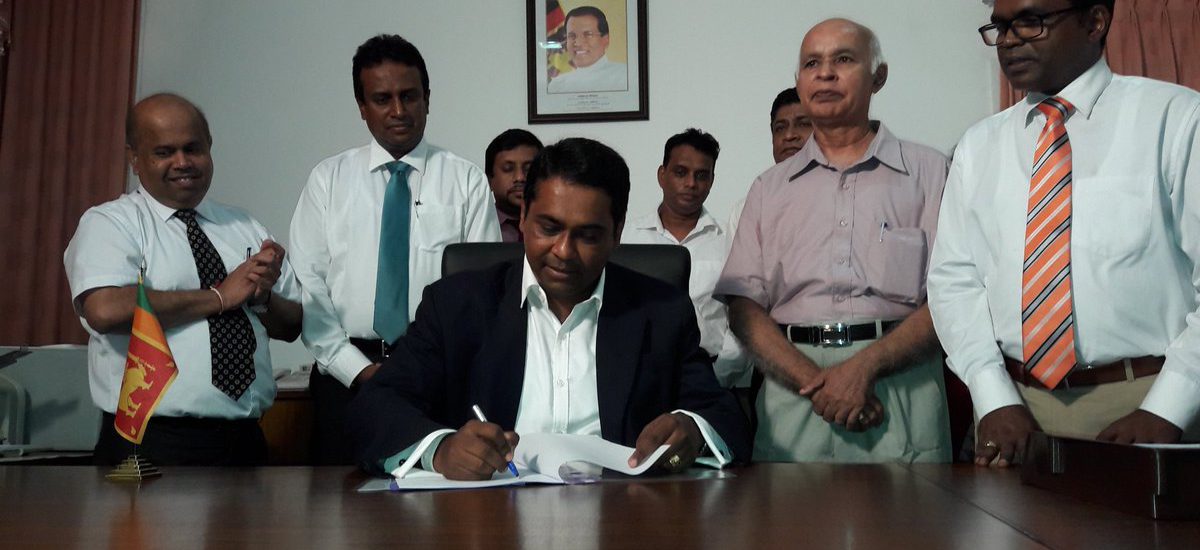Featured image courtesy Rifthi Ali
Media ethics became the focal point of discussion at a ‘post-mortem’ on a recent incident involving the Navy Commander assaulting journalist Roshan Gunasekera as he covered the Navy action to open the Magampura (Hambantota) port, which had been blocked by protesting port workers.
At a discussion organised by the Young Journalists’ Association at the Government Information Department on December 15, Director General Ranga Kalansooriya began by regretting the statement he had made as he felt it “could have been misunderstood“.
Yet, while he condemned the attack, Kalansooriya spent most of his time giving an impromptu presentation on media ethics. In particular, he said that the journalist concerned had “crossed the line” and had gone too close to the protesters. “This is a hostile situation… a sensitive situation involving conflict,” he said, adding that there was a need for training on conflict reporting.
This position was rejected by most of the journalists present, including Convenor of the Media Movement for Democracy Chandana Sirimalwatte, who asked why Kalansooriya had glossed over the government’s own culpability in rushing to accuse the journalist of violating ethics.
“Before talking about media ethics we want to ask government what action it has taken with regard to the journalists who were killed under the previous regime,” he added.
Why wait for an incident to happen to talk ethics? https://t.co/Auvff4kTA9
— Chandani Kirinde (@ChandaniKirinde) December 15, 2016
Convenor of the Free Media Movement Seetha Ranjanee also condemned the incident.
"Navy Commander shd have asked journalist to move rather than use violence, even if he acted wrongly," Seetha Ranjanee, FMM #lka #Sri Lanka pic.twitter.com/x9w9Ohcw69
— Groundviews (@groundviews) December 15, 2016
Deputy Mass Media Minister Karunarathna Paranavithana also condemned the Navy Commander’s actions, adding he “should have thought about the ‘people’s mandate’ this government had been elected under”.
He said that the Commander had a duty to be at the Port, as he was the authority in dealing with issues pertaining to ports and shipping. “We could not have used the police for this,” he said.
While the government representatives made cosmetic statements of condemnation, much of the discussion focused around media ethics. Kalansooriya in particular spent much of the time allotted to him elaborating on various incidents where journalists had disregarded warnings not to get too close to a conflict-ridden area, and had paid the price with their lives.
This was not accepted by many of the journalists gathered. At one point, Kalansooriya, listening to a journalist expounding on a point, simply said, “You have a perception problem”.
And while the post-mortem began with Kalansooriya saying he wanted to foster a culture of discussion and participation with different stakeholders, it was worrying that there appeared to have been no consensus reached. All the more worrying as the Government Information Department has called for public consultations with a view to “introducing an independent oversight mechanism to foster professional standards, with mandatory powers over media outlets” particularly as the undertone to Kalansooriya’s comments appeared to be that, should a journalist violate ethical considerations (which is certainly to be condemned) then they somehow ‘deserved’ to be dealt with violently.
However, there was no clearer statement than Prime Minister Wickremesinghe’s reaction:
PM's only mention about Journo attack after meeting Navy, is to tell media orgs that journalist has complained to the wrong police station
— Azzam Ameen (@AzzamAmeen) December 15, 2016
Prime minister thanked Navy commander for his successful operation in Hambanthota port pic.twitter.com/HMgN0Uml8X
— Ranga Sirilal (@rangaba) December 15, 2016
After being elected on a platform which specifically spoke of protecting and promoting media freedom, this turnaround is sobering, although perhaps unsurprising.
Below is a recording from the event, beginning from Kalansooriya’s comments.

